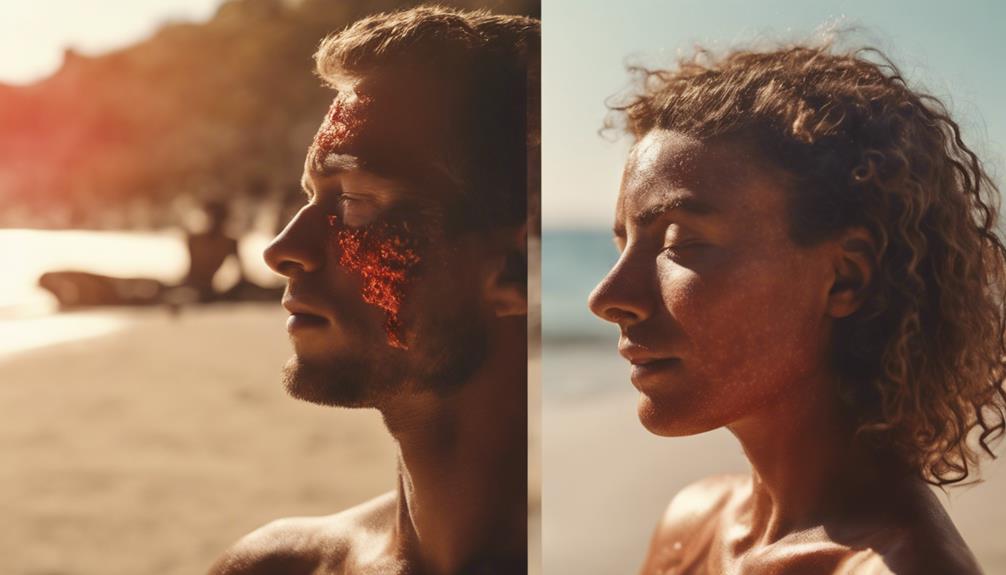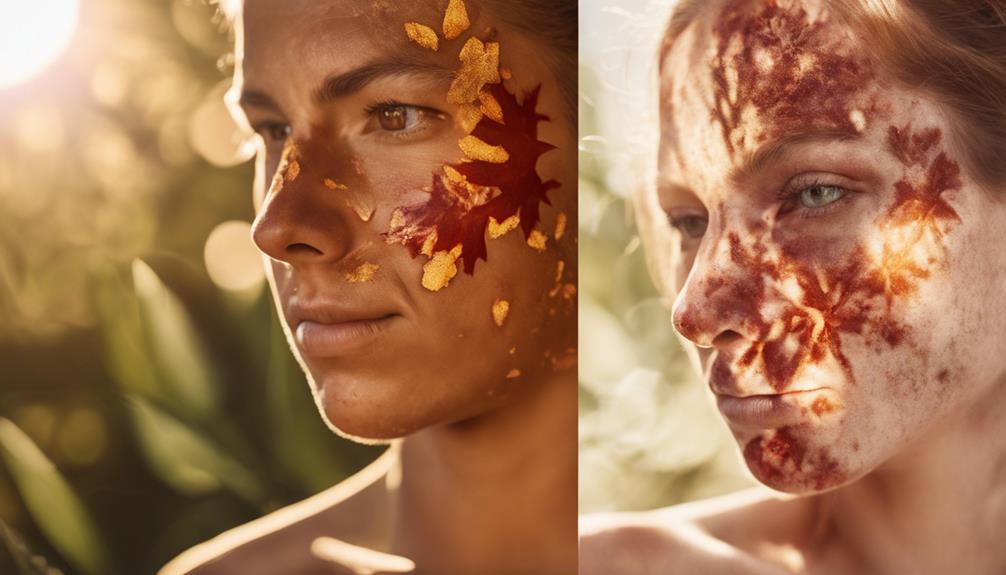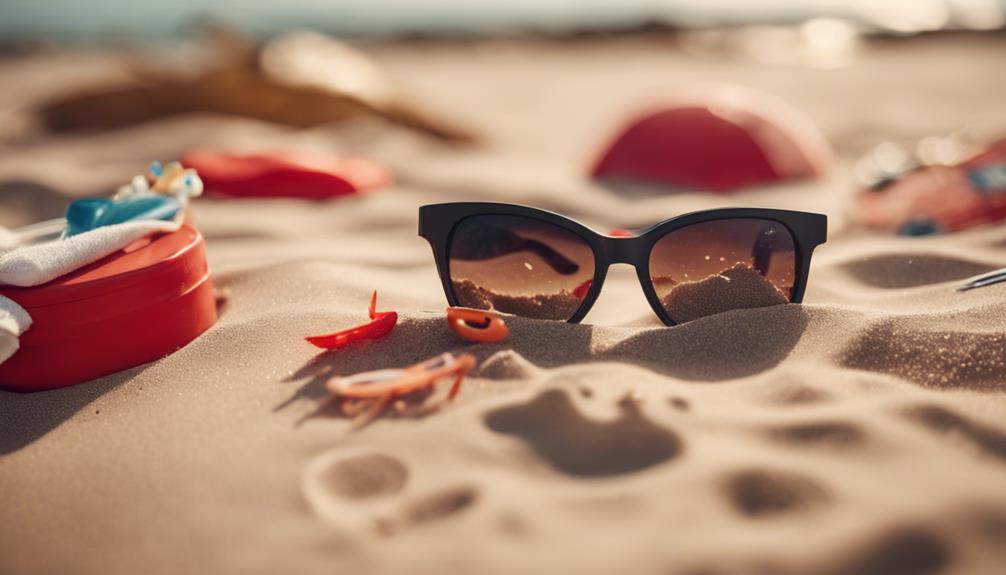So, you're wondering about sunburns versus tans, huh? Here's the scoop: sunburns are your skin's way of crying for help after too much UV exposure—ouch! On the flip side, a tan is actually your skin saying, "I'm hurt but trying to protect myself!" It's like getting a badge for damage you didn't sign up for. Both are signs you need to chill with the sun, so always use sunscreen, even if you think you're tough! Trust me, protecting your skin now means fewer wrinkles later. Stick around, and you'll discover even more ways to keep your skin happy and healthy!
Key Takeaways
- Sunburn is a painful response to excessive UV exposure, while a tan is skin's protective reaction by increasing melanin production.
- Both sunburn and tanning indicate skin damage; tanning is not a healthy alternative to sunburn.
- Fair-skinned individuals are more likely to burn, while darker skin types tan more easily but still require sun protection.
- A base tan does not prevent sunburn; safe tanning alternatives include self-tanners and spray tans.
Skin Types and Their Responses
Understanding your skin type is essential because it directly affects how your skin reacts to sun exposure and determines your risk for burns and tanning.
You might be a Type 1, fair and freckly, or a Type 6, rich in melanin. The Fitzpatrick scale helps you figure it out.
If you're on the fair side, you've probably experienced that painful sunburn after just a little too much fun in the sun. Ouch!
Meanwhile, if you've got darker skin, you might tan like a pro, but don't think you're invincible. Everyone needs sun protection!
Knowing your skin type helps you pick the right sunscreen and keeps your skin happy and healthy.
UV Radiation Effects

UV radiation penetrates your skin, causing damage that can lead to sunburn, premature aging, and an increased risk of skin cancer. Ouch, right? When you bask in the sun, those rays are like tiny ninjas, sneaking in and wreaking havoc.
You might think a tan looks great, but it's actually your skin's way of saying, “Help, I'm hurt!” Every time you burn, you're putting yourself at risk for long-term problems, like wrinkles that'll make you say, “Where did those come from?”
Tanning Myths Debunked

Many people still believe common myths about tanning, unaware that these misconceptions can lead to harmful practices and increased skin damage.
For instance, thinking a base tan protects you from sunburn is like saying wearing a raincoat means it won't rain!
And let's not even start on tanning beds—they're not the safe alternative you might think. They increase your skin cancer risk just like sunbathing does.
Plus, there are plenty of UV-free options to get that sun-kissed glow without the danger.
So, why not skip the harmful stuff and opt for self-tanners or spray tans?
Embracing safer methods means you can enjoy a bronzed look without the worry. Your skin will thank you later!
Sun Damage Prevention Strategies

To effectively protect your skin from sun damage, it's crucial to adopt a combination of preventive strategies that guarantee your safety while enjoying the outdoors.
First off, don't forget to slather on that SPF 30 sunscreen—your skin will thank you later! Be sure to reapply every two hours, especially if you're sweating or swimming.
Next, try to limit your time in the sun, especially between 10 a.m. and 4 p.m., when those rays are the strongest.
And hey, rocking a wide-brimmed hat and some stylish shades not only looks cool but also protects your face and eyes.
Safe Tanning Alternatives

What if you could achieve that sun-kissed glow without risking your skin's health? Sounds dreamy, right? Well, you can! Self-tanners and spray tans are your best buddies here. They give you that bronzed look without the sun's harsh rays. Plus, no more worrying about turning into a lobster!
And don't forget those tinted moisturizers—they're like magic potions for a subtle glow. Just apply, and boom, you're ready to shine!
While you're at it, check out bronzing lotions for a quick touch-up.
Understanding Skin Reactions

Understanding how your skin reacts to UV exposure is essential for protecting your health and achieving that desired tan without the burn.
You might think a little sun is harmless, but your skin tells a different story. When UV rays hit your skin, it ramps up melanin production—your body's way of saying, “Hey, let's protect ourselves!”
However, if you're fair-skinned, you might burn instead. Ouch, right? Knowing your skin type helps you figure out how much sun you can handle.
So, whether you're a tanning newbie or a sunbathing pro, listen to your skin. It's got opinions! Remember, the goal is to glow, not to go redder than a lobster!
Current Trends in Tanning Practices

As you grasp how your skin reacts to UV exposure, it's important to keep up with the latest trends in tanning practices that prioritize safety and skin health.
Gone are the days of baking in the sun or hitting the tanning beds like they're the best thing since sliced bread. Nowadays, self-tanners and spray tans are all the rage! They give you that sun-kissed glow without the harmful UV rays.
Plus, people are getting savvy about using SPF 30+ sunscreen. Seriously, who wants to deal with a sunburn?
And let's not forget protective gear like cute hats and stylish shades.
Frequently Asked Questions
How Long Does It Take for a Sunburn to Develop After Exposure?
After sun exposure, you might notice a sunburn developing within 2 to 6 hours, peaking around 24 to 48 hours later. Protect your skin by applying sunscreen before going out to minimize damage.
Can Tan Lines Cause Uneven Skin Tone Over Time?
Ever noticed how tan lines can create a patchwork on your skin? Yes, they can lead to uneven skin tones over time. Regular exfoliation and moisturizing help minimize these effects and maintain a more uniform complexion.
What Are the Long-Term Effects of Repeated Sunburns?
Repeated sunburns can lead to skin damage, increased risk of skin cancer, premature aging, and a higher likelihood of developing melanoma. You should prioritize sun protection to minimize these long-term effects and maintain healthy skin.
How Can I Soothe a Sunburn Effectively at Home?
When it comes to soothing a sunburn, you'll want to strike while the iron's hot. Apply aloe vera, take cool baths, and stay hydrated. Avoid tight clothing, and let your skin heal naturally.
Does Drinking Water Help With Sunburn Recovery?
Drinking water helps with sunburn recovery by keeping your skin hydrated and promoting healing. It won't directly soothe the burn, but staying hydrated can assist your body in repairing damaged skin more effectively.
Conclusion
So, next time you hit the beach and feel that sun kissing your skin, remember you're not just getting a tan; you're also risking a sunburn.
It's like your skin's version of a medieval knight putting on armor—sure, it looks cool, but it's still got some serious battles to fight!
Keep that sunscreen handy, rock those shades, and enjoy the sun safely.
Your skin will thank you later, and you'll avoid looking like a lobster!










